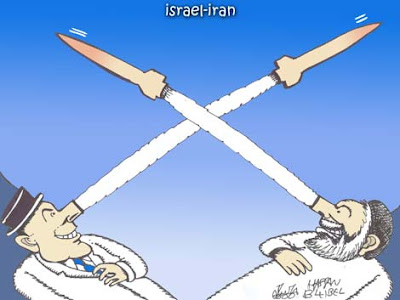
por Amir Taheri
On Monday the Iraqi Army launched a large-scale offensive in Diyala north of Baghdad to wipe out al-Qaeda's last remaining hideouts in the country. Since the tide of the war turned last winter, thousands of al-Qaeda jihadists have fled Iraq.
Some returned home and resumed normal life. Others, looking for new places to pursue their holy war against “Zionists and Crusaders”, ended up in Yemen, Afghanistan, Pakistan, India and Thailand and helped to reignite the fires of jihad.
However, North Africa appears to have attracted the largest number of returnees. According to the buzz in jihadist circles, confirmed by officials and analysts, a new arc of terror is taking shape in Libya, Tunisia, Algeria, Morocco and Mauritania - the five countries of the so-called Arab Maghreb in North Africa.
Algeria was first struck by Islamic terror in 1986. Seven years of violence were triggered by the Front for the Islamic Salvation (FIS) in 1992, but by 2000, the Army and groups of armed citizens had crushed the FIS and its more violent offshoots. In 2006 Algerian jihadists announced a merger with al-Qaeda to create al-Qaeda in the Maghreb. Since then they have received huge sums of money and quantities of arms from al-Qaeda sympathisers in the Gulf states, enabling them to make a timid - though no less deadly - comeback.
By all accounts, Algeria may be facing a new round of the War against Terror as it faces mounting political and economic problems. In the first phase of the war, Algerian jihadists never used suicide tactics. In recent months they have carried out at least four such operations, indicating total adoption of al-Qaeda tactics. They have also tried to kill President Bouteflika on at least four occasions. The latest plot was uncovered last week, 24 hours before a provincial visit.
Last month the President invited Ahmed Ouyahya, the architect of Algeria's victory against the terrorists, to assume the premiership again. His return acknowledges that the policy of cuddling the Islamists, preached by the former Premier, Abdulaziz Belkhadem, has failed.
While Algeria is well prepared to face a resurgence of jihadism, Morocco, long recognised as one of the most moderate and peaceful countries in the Muslim world, may prove more vulnerable.
Visitors returning after three or four years would be struck by changes in the urban scenery. The number of al-Qaeda-style beards has grown along with the number of neo-hijab headscarves designed to identify women as partisans of jihad. Women in jeans or mini-skirts have all but disappeared from public, along with all females who favoured the colourful dress of the Berber. One sees countless women draped in black that remind one of Hitchcock's The Birds. Jihadist propaganda is sold on the streets in stalls provided by the municipal authorities.
Fewer and fewer places serve alcohol, and parts of the main cities are becoming no-go areas for foreign tourists. Over the past year, almost 1,000 people have been arrested in connection with terrorism after attacks that claimed at least 60 lives.
Few of the jihadists come from the poor and illiterate slum-dwelling masses. Most of those arrested are graduates, often from well-to-do middle-class families.
More disturbing is that dozens were army, police and security officers. According to a senior official, the jihadists used the Army to obtain military training and the Government had to abolish the conscription system that obliged all male Moroccans to join the Army for two years. The Government has also banned military personnel from attending mosque congregations.
Moroccan Islamists use a more sophisticated strategy than their Algerian counterparts. While preparing for armed action and terrorism, they have also created a range of charities offering services that the Government fails to provide, such as interest-free loans, medical care, scholarships, support for newlyweds and subsidised travel to Mecca. All are handled under the umbrella of the Justice and Benevolence foundation, an old branch of the Muslim Brotherhood.
Moroccan Islamism has its own political facade, the Justice and Development Party ( PJD) copied from the Turkish model known as the AKP. Hundreds of PJD cadres have been trained in Turkey.
In imitation of the AKP, the PJD has participated in elections and presented itself as an Islamic version of European Christian Democratic parties. It has also worked hard to reassure the US. Its leaders have been invited to Washington and its young cadres employed in Congress. Last year when King Muhammad VI wanted to ban the PJD, the US intervened to dissuade him. Last week the king published a cable of congratulations that he had sent the party for the success of its annual conference. But despite the huge sums it spent in last year's election, the PJD ended up with only 47 of the 325 seats in parliament.
Moroccan Islamism operates through what looks like a set of Russian Matryushka dolls. The smallest and the deadliest, hidden in the others, is the Group of Islamic Moroccan Combatants (GICM), an al-Qaeda affiliate and architect of the Madrid terror attack that claimed 191 lives. Another doll is the contraband network that purchases most of Morocco's production of hashish and smuggles it into Europe. The profits are used to finance jihad.
According to Moroccan officials, an unknown number of jihadists from the Gulf states have settled in the North African kingdom over the past decade or so, creating sleeper cells. “We know they are there,” a senior official told me. “Many have married Moroccans and produced offspring. Thanks to their wealth, they have secured a reputation in the communities they settled in. But they constitute an army of moles, a danger to us and to Europe across the Mediterranean.” While al-Qaeda is being crushed in Iraq, Saudi Arabia and Afghanistan, it is building a new life in North Africa without attracting attention from the powers it regards as its ultimate enemies.
http://www.timesonline.co.uk/tol/comment/columnists/guest_contributors/article4425820.ece
JPTF 2008/07/30








